In copertina: San Camillo e san Giovanni di Dio: farsi carico del fratello
TIME TO START BREATHING AGAIN
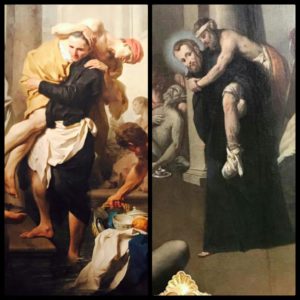 “Return to me with all your heart… return to the Lord” (Jl 2:12, 13). The prophet Joel makes this plea to the people in the Lord’s name. No one should feel excluded: “Assemble the aged, gather the children, even infants at the breast, the bridegroom… and the bride” (v. 16). All the faithful people are summoned to come and worship their God, “for he is gracious and merciful, slow to anger and abounding in steadfast love” (v. 13).
“Return to me with all your heart… return to the Lord” (Jl 2:12, 13). The prophet Joel makes this plea to the people in the Lord’s name. No one should feel excluded: “Assemble the aged, gather the children, even infants at the breast, the bridegroom… and the bride” (v. 16). All the faithful people are summoned to come and worship their God, “for he is gracious and merciful, slow to anger and abounding in steadfast love” (v. 13).
We too want to take up this appeal; we want to return to the merciful heart of the Father. In this season of grace that begins today, we once again turn our eyes to his mercy. Lent is a path: it leads to the triumph of mercy over all that would crush us or reduce us to something unworthy of our dignity as God’s children. Lent is the road leading from slavery to freedom, from suffering to joy, from death to life. The mark of the ashes with which we set out reminds us of our origin: we were taken from the earth, we are made of dust. True, yet we are dust in the loving hands of God, who has breathed his spirit of life upon each one of us, and still wants to do so. He wants to keep giving us that breath of life that saves us from every other type of breath: the stifling asphyxia brought on by our selfishness, the stifling asphyxia generated by petty ambition and silent indifference – an asphyxia that smothers the spirit, narrows our horizons and slows the beating of our hearts. The breath of God’s life saves us from this asphyxia that dampens our faith, cools our charity and strangles every hope. To experience Lent is to yearn for this breath of life that our Father unceasingly offers us amid the mire of our history.
The breath of God’s life sets us free from the asphyxia that so often we fail to notice, or become so used to that it seems normal, even when its effects are felt. We think it is normal because we have grown so accustomed to breathing air in which hope has dissipated, the air of glumness and resignation, the stifling air of panic and hostility.
Lent is the time for saying no. No to the spiritual asphyxia born of the pollution caused by indifference, by thinking that other people’s lives are not my concern, and by every attempt to trivialize life, especially the lives of those whose flesh is burdened by so much superficiality. Lent means saying no to the toxic pollution of empty and meaningless words, of harsh and hasty criticism, of simplistic analyses that fail to grasp the complexity of problems, especially the problems of those who suffer the most. Lent is the time to say no to the asphyxia of a prayer that soothes our conscience, of an almsgiving that leaves us self-satisfied, of a fasting that makes us feel good. Lent is the time to say no to the asphyxia born of relationships that exclude, that try to find God while avoiding the wounds of Christ present in the wounds of his brothers and sisters: in a word, all those forms of spirituality that reduce the faith to a ghetto culture, a culture of exclusion.
Lent is a time for remembering. It is the time to reflect and ask ourselves what we would be if God had closed his doors to us. What would we be without his mercy that never tires of forgiving us and always gives us the chance to begin anew? Lent is the time to ask ourselves where we would be without the help of so many people who in a thousand quiet ways have stretched out their hands and in very concrete ways given us hope and enabled us to make a new beginning?
Lent is the time to start breathing again. It is the time to open our hearts to the breath of the One capable of turning our dust into humanity. It is not the time to rend our garments before the evil all around us, but instead to make room in our life for all the good we are able to do. It is a time to set aside everything that isolates us, encloses us and paralyzes us. Lent is a time of compassion, when, with the Psalmist, we can say: “Restore to us the joy of your salvation, sustain in us a willing spirit”, so that by our lives we may declare your praise (cf. Ps 51:12.15), and our dust – by the power of your breath of life – may become a “dust of love”.
HOLY MASS, BLESSING AND IMPOSITION OF THE ASHES
HOMILY OF HIS HOLINESS POPE FRANCIS
Wednesday, 1sMarch 2017
THE DELEGATION OF CENTRAL AFRICA
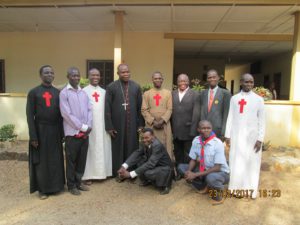 The Archbishop of Bangui, Monsignor Dieudonné Nzapalainga, who was recently made a Cardinal, paid a visit to the Camillian religious of Bossemptele. This messenger of peace urged the religious and the Christians of that community to persevere on the pathway of reconciliation, of love and of peace. He visited and blessed individually all the patients of our hospital, a hospital that is dedicated to St. John Paul II.
The Archbishop of Bangui, Monsignor Dieudonné Nzapalainga, who was recently made a Cardinal, paid a visit to the Camillian religious of Bossemptele. This messenger of peace urged the religious and the Christians of that community to persevere on the pathway of reconciliation, of love and of peace. He visited and blessed individually all the patients of our hospital, a hospital that is dedicated to St. John Paul II.
THE DELEGATION OF INDONESIA
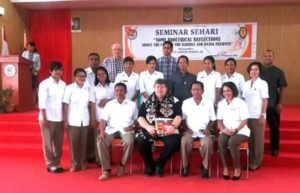 During his recent visit to the Camillian mission on the Island of Flores, Father Leocir Pessini, the Superior General of the Camillians, gave a series of papers on bioethics and pastoral care for sick people.
During his recent visit to the Camillian mission on the Island of Flores, Father Leocir Pessini, the Superior General of the Camillians, gave a series of papers on bioethics and pastoral care for sick people.
Cf. the pictures of the fraternal visit to the Camillian religious of Indonesia (section for formation) of Fr. Leocir Pessini and Fr. Laurent Zoungrana.
Maumere (Agenzia Fides) – cf. READ THE ARTICLE HERE.
Seminars on education in health care for students and a medical mission for over 600 patients.
Maumere (Agenzia Fides). Ever since their arrival in the diocese of Maumere, on the Island of Flores, Indonesia, in 2009, the Camillian religious have promoted the celebration of the World Day of the Sick with various initiatives in the diocese. READ THE ARTICLE HERE.
THE DELEGATION IN KENYA
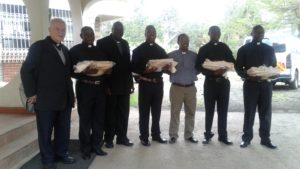 Four young Camillian religious, Dominic Mutuku, Dennis Atandi, John Kariuki and Patrick Makau, were ordained deacons on 18 February of this year. The celebration was presided over by Msgr. Peter Kihara Kariuki, the Bishop of the diocese of Marsabit.
Four young Camillian religious, Dominic Mutuku, Dennis Atandi, John Kariuki and Patrick Makau, were ordained deacons on 18 February of this year. The celebration was presided over by Msgr. Peter Kihara Kariuki, the Bishop of the diocese of Marsabit.
THE CAMILLIANS IN BURUNDI
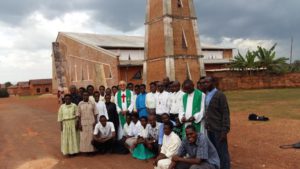 The Camillians are present in about ten countries in Africa. After the first failed attempt in the Sudan at the end of the nineteenth century with Fr. Stanislao Carcereri, the Camillians settled in Tanzania (1959), Burkina Faso (1966) and Benin (1971), and then also established centres in Togo and the Central African Republic, Kenya (1976), Madagascar (1977), Uganda (2000), and recently also in the Ivory Coast (2015). For a short time they were also in Senegal. Nobody, however, knew that there are also Camillians in Burundi, even though ‘incognito’, and outside any juridical framework.
The Camillians are present in about ten countries in Africa. After the first failed attempt in the Sudan at the end of the nineteenth century with Fr. Stanislao Carcereri, the Camillians settled in Tanzania (1959), Burkina Faso (1966) and Benin (1971), and then also established centres in Togo and the Central African Republic, Kenya (1976), Madagascar (1977), Uganda (2000), and recently also in the Ivory Coast (2015). For a short time they were also in Senegal. Nobody, however, knew that there are also Camillians in Burundi, even though ‘incognito’, and outside any juridical framework.
READ HERE THE ARTICLE by Fr. Paolo Guarise
Rome – THE CAMILLIANUM
In illness and suffering the Churches are closer to one another. Five hundred years after the Reformation of Luther
On the one hand, we observe the advance of science, with its greater results at the level of being able to control pain, on the other a spiritual deficit is highlighted in relation to the intelligence of suffering.
Catholics and Protestants agree that suffering is a symptom of the constitutive limit of man and a ‘setting of solidarity between man and God’ (L. Pareyson). From this shared penultimate horizon it is possible to outline shared pathways for the defence of frailty, albeit with the continuation of constitutive differences as regards human autonomy and the sacraments.
BRAZIL
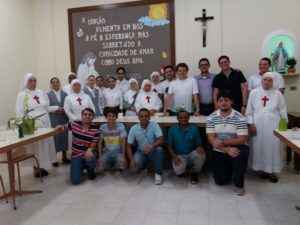 During the period of the carnival holidays, the ‘philosophy’ students of the Province of Brazil engaged in a spiritual retreat animated by Fr. Clair Kozik in the house of the Sons of St. Camillus.
During the period of the carnival holidays, the ‘philosophy’ students of the Province of Brazil engaged in a spiritual retreat animated by Fr. Clair Kozik in the house of the Sons of St. Camillus.
THE THIRD INTERNATIONAL MEETING OF CAMILLIAN PARISH PRIESTS AND RECTORS Santa Fe Centre, SP Brazil 19-23 April 2017
 Parishes as a setting for communion (koinonia), for evangelisation (kerygma) and for mission (diakonia)
Parishes as a setting for communion (koinonia), for evangelisation (kerygma) and for mission (diakonia)
‘In a community, gathered together around Christ, we become Camillians, that is to say we are invited to perform the same merciful mission of Jesus who called together and then sent out his disciples (Lk 10:37). Each Camillian lives his being ‘sent out’ on a mission, which is the finalisation itself of his personal vocation’ (cf. The Camillian Project for a Faithful and Creative Life: Challenges and Opportunities, 2.5).
Click here to download the programme and the invitation ITALIAN/ ENGLISH
A HISTORY OF THE ORDER OF ST. CAMILLUS – THE PROVINCE OF LOMBARDY AND VENETO
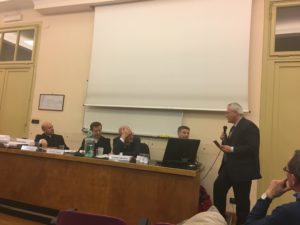 On Monday 13 March 2017, t 17.00, at LUMSA University of Rome, the launch took place of the new book in the series ‘Storia dell’Ordine di San Camillo’ (‘A History of the Order of St. Camillus’) on the Province of Lombardy and Veneto. This is the last volume in the series which was begun to celebrate the fourth centenary of the death of St. Camillus.
On Monday 13 March 2017, t 17.00, at LUMSA University of Rome, the launch took place of the new book in the series ‘Storia dell’Ordine di San Camillo’ (‘A History of the Order of St. Camillus’) on the Province of Lombardy and Veneto. This is the last volume in the series which was begun to celebrate the fourth centenary of the death of St. Camillus.
THE PROVINCE OF NORTH ITALY
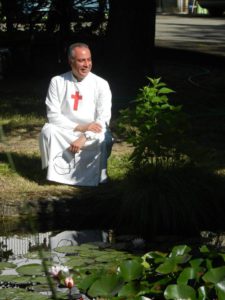 The exorcist of Forlì dealing with the possessed of Forlì: ‘But many have only tormented them’.
The exorcist of Forlì dealing with the possessed of Forlì: ‘But many have only tormented them’.
Interview with the Camillian religious Fr. Marco Causarano, the new exorcist of the diocese of Forlì-Bertinoro.
PROVINCIAL CHAPTERS 2017
In the month of March Provincial Chapters were held in the Camillian Provinces of the Order. Below are the pictures and the reports of the meetings.
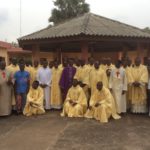 Chapter of the Vice-Province of Benin-Togo
Chapter of the Vice-Province of Benin-Togo
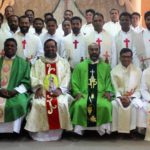 Chapter of the Province of India
Chapter of the Province of India
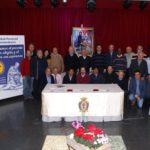 Chapter of the Province of Spain
Chapter of the Province of Spain
 Chapter of the Province of Rome
Chapter of the Province of Rome
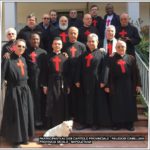 Chapter of the Province of Sicily and Naples
Chapter of the Province of Sicily and Naples
THE DELEGATION OF COLOMBIA-ECUADOR
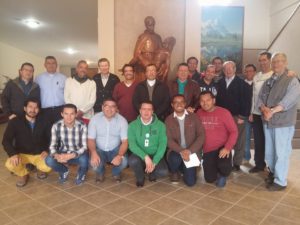 The Camillian Delegation of Colombia-Ecuador held an assembly on 7-8 March for the final meeting of the four-year period 2013-17.
The Camillian Delegation of Colombia-Ecuador held an assembly on 7-8 March for the final meeting of the four-year period 2013-17.
Counting on the presence of all the perpetually professed religious (with the exception of one whose absence was justified), and accompanied by three temporary professed in the last year of their theology studies, we discussed the current activity of the Delegation, assessing the work of the last four years and examining our future prospects:
- Current matters: a presentation by the Superiors and other heads of the activities of each community in the various areas of the Delegation.
- The development of the four-year period (2013-2017): an analysis in the light of the project of the Delegation, of the Camillian project, of the Message to the Order by the Superior General (2014), also bearing in mind the Messages of the Provincial Superior and the General Superior following the recent pastoral visits.
- Prospects: priorities, gudelines for action, planning …
- Reference was also made to the new directives that will guide the next three-period of the Delegation (2017-2020)
THE PHILIPPINES
The new edition of CamUp is available online. This is the newsletter of the Camillian Province of the Philippines.
THE CONSTITUTION AND GENERAL STATUTES – TRANSLATIONS INTO VARIOUS LANGUAGES
Translations into Spanish and German of the Constitution and General Statutes of the Order have been produced by the Province of Spain and the Province of Germany. The Superior General, in conformity with GS, n. 158, has approved these translations and authorised their printing and dissemination amongst Camillian religious.
THE VICE-PROVINCE OF PERU
The Superior General has admitted to perpetual profession the temporary professed Arquimedes Ramos Zurita of the Vice-Province of Peru.
TV2000 – La storia di San Camillo a difesa degli infermi
 L’intervista a p.Gianfranco Lunardon, Segretario generale, andata in onda IL 16 MARZO, durante la trasmissione di Tv2000 “Bel tempo si spera”.
L’intervista a p.Gianfranco Lunardon, Segretario generale, andata in onda IL 16 MARZO, durante la trasmissione di Tv2000 “Bel tempo si spera”.
PUBLISHING SUGGESTIONS
Il Servo di Dio Fratel Ettore Boschini (‘The Servant of God Brother Ettore Boschini’)
Un gigante di carità (‘A giant of charity’)
‘Brother Ettore made himself the last with the last. He did not only welcome them. He also sought them out, out of love and faith, as living and beating images of the Son of God who became man and made himself mysteriously present in every poor and suffering person, because hungry and thirsty, foreigners and naked, sick and in prison’.
These words, pronounced by Cardinal Tettamanzi, capture the life of Brother Ettore Boschini, a humble Camillian religious who, trusting in divine Providence and accepting with gratitude the help of very many friends and benefactors, set in motion a work of charity that started in Milan and then spread beyond the borders of Italy. This small volume describes the life and the works of Brother Ettore who, with his centres of charity, the ‘shelters’, over about twenty years offered assistance and hope to about 85,000 people. He relied upon very many volunteers who were ready to follow him and help him in his activities which still continue today with the work of the Missionaries of the Immaculate Heart of Mary
Il piccolo gregge – San Camillo de Lellis a fumetti (‘The Small Flock – St. Camillus in Cartoons’)
 Series: Piccoli semi
Series: Piccoli semi
Authors: Tommaso D’Incalci and Elena Pascoletti
Camillus was a tall and strong boy and after experiencing illness placed his energies at the service of suffering people.
26 March 1967 is the fiftieth anniversary of the promulgation of the encyclical letter POPULORUM PROGRESSIO of Pope Paul VI
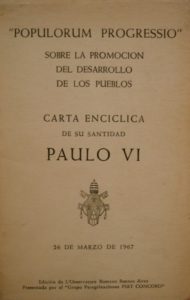 This is the fiftieth anniversary of the great social encyclical of Paul VI, Populorum progressio (26 March 1967). The central axis of the entire encyclical is development and here we find a very fine definition made by Paul VI: ‘Development is the new name of peace’.
This is the fiftieth anniversary of the great social encyclical of Paul VI, Populorum progressio (26 March 1967). The central axis of the entire encyclical is development and here we find a very fine definition made by Paul VI: ‘Development is the new name of peace’.
As Paul VI states in Populorum progressio, one of the fundamental tasks of the actors of the world economy is to achieve integral and solidarity-inspired development for humanity, that is to say, ‘the promotion of each man and of the whole man’. This task requires a conception of the economy that assures at a world level a fair distribution of resources and corresponds to an awareness of the economic, political and cultural interdependence that unites the peoples of the world in a definitive way and makes them feel that they are connected to a single destiny.
This encyclical of Paul VI lays a great deal of emphasis on the fight against poverty. The principle of solidarity, in the fight against poverty as well, must always be flanked by the principle of subsidiarity, thanks to which it is possible to stimulate a spirit of initiative – which is the fundamental basis of all socio-economic development – in poor countries themselves. One should not look at the poor as a problem but as those who have to become the subjects and protagonists of a new and more human future for the whole of the world.
In the social thought of Paul VI, the safeguarding of the creation plays a crucial role because if man destroys the environment he ends up by destroying himself. This thought was taken up with great vigour by Pope Francis in his social encyclical Laudato sì on care for the common home which was addressed to all men on earth. Christians, today, are called upon to place themselves at the ‘service of the integration of the poor into society and at the service of reconciliation in the world’. This is because ‘the message of the Gospel today passes by way of the healing of bodies and service to the frailest beings in order to flow into the communion of peoples’.
And where fifty years ago Paul VI pointed out to humanity a ‘progress of peoples’, this development today must develop, according to what Pope Francis invokes, into a ‘communion of peoples’ and the key by which to achieve this is Mercy. ‘As the word itself says, this is a matter of caring for those who live in misery. This is a new sensitivity that enables us to be touched by the other and leads us to develop a new way of acting’.
POPULORUM PROGRESSIO
ENCYCLICAL OF POPE PAUL VI ON THE DEVELOPMENT OF PEOPLES
MARCH 26, 1967
The progressive development of peoples is an object of deep interest and concern to the Church. This is particularly true in the case of those peoples who are trying to escape the ravages of hunger, poverty, endemic disease and ignorance; of those who are seeking a larger share in the benefits of civilization and a more active improvement of their human qualities; of those who are consciously striving for fuller growth.
The Church’s Concern
With an even clearer awareness, since the Second Vatican Council, of the demands imposed by Christ’s Gospel in this area, the Church judges it her duty to help all men explore this serious problem in all its dimensions, and to impress upon them the need for concerted action at this critical juncture.
Justice and Peace
- Even more recently, We sought to fulfill the wishes of the Council and to demonstrate the Holy See’s concern for the developing nations. To do this, We felt it was necessary to add another pontifical commission to the Church’s central administration . The purpose of this commission is “to awaken in the People of God full awareness of their mission today. In this way they can further the progress of poorer nations and international social justice, as well as help less developed nations to contribute to their own development.”
The name of this commission, Justice and Peace, aptly describes its program and its goal. We are sure that all men of good will want to join Our fellow Catholics and fellow Christians in carrying out this program. So today We earnestly urge all men to pool their ideas and their activities for man’s complete development and the development of all mankind.
- MAN ‘S COMPLETE DEVELOPMENT
- Today we see men trying to secure a sure food supply, cures for diseases, and steady employment. We see them trying to eliminate every ill, to remove every obstacle which offends man’s dignity. They are continually striving to exercise greater personal responsibility; to do more, learn more, and have more so that they might increase their personal worth. And yet, at the same time, a large number of them live amid conditions which frustrate these legitimate desires.
Moreover, those nations which have recently gained independence find that political freedom is not enough. They must also acquire the social and economic structures and processes that accord with man’s nature and activity, if their citizens are to achieve personal growth and if their country is to take its rightful place in the international community.
The Widening Gap
- Granted all this, it is only too clear that these structures are no match for the harsh economic realities of today. Unless the existing machinery is modified, the disparity between rich and poor nations will increase rather than diminish; the rich nations are progressing with rapid strides while the poor nations move forward at a slow pace.
The imbalance grows with each passing day: while some nations produce a food surplus, other nations are in desperate need of food or are unsure of their export market.
Signs of Social Unrest
- At the same time, social unrest has gradually spread throughout the world. The acute restlessness engulfing the poorer classes in countries that are now being industrialized has spread to other regions where agriculture is the mainstay of the economy. The farmer is painfully aware of his “wretched lot.”
Then there are the flagrant inequalities not merely in the enjoyment of possessions, but even more in the exercise of power. In certain regions a privileged minority enjoys the refinements of life, while the rest of the inhabitants, impoverished and disunited, “are deprived of almost all possibility of acting on their own initiative and responsibility, and often subsist in living and working conditions unworthy of the human person.”
Cultural Conflicts
- Moreover, traditional culture comes into conflict with the advanced techniques of modern industrialization; social structures out of tune with today’s demands are threatened with extinction. For the older generation, the rigid structures of traditional culture are the necessary mainstay of one’s personal and family life; they cannot be abandoned. The younger generation, on the other hand, regards them as useless obstacles, and rejects them to embrace new forms of societal life.
The conflict between generations leads to a tragic dilemma: either to preserve traditional beliefs and structures and reject social progress; or to embrace foreign technology and foreign culture, and reject ancestral traditions with their wealth of humanism. The sad fact is that we often see the older moral, spiritual and religious values give way without finding any place in the new scheme of things.
- In such troubled times some people are strongly tempted by the alluring but deceitful promises of would-be saviours. Who does not see the concomitant dangers: public upheavals, civil insurrection, the drift toward totalitarian ideologies?
These are the realities of the question under study here, and their gravity must surely be apparent to everyone.
For further reading:
http://w2.vatican.va/content/paul-vi/en/encyclicals/documents/hf_p-vi_enc_26031967_populorum.html



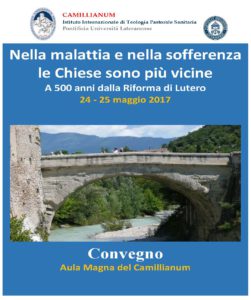
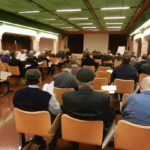


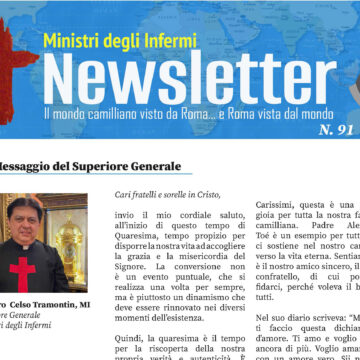










Camillians on Facebook
Camillians on Twitter
Camillians on Instagram